Dental Implants in Turkey
Change Your Smile,
Change Your Life In Istanbul
Dental Implants really help. Missing teeth can impact more than your smile. They affect how you eat, speak, and feel day to day. With dental implant solutions at Vitapera, you regain both confidence and comfort through permanent, natural-looking results. Start your journey with affordable dental implants designed to last.

Contact Us
(+90) 536 558 12 88
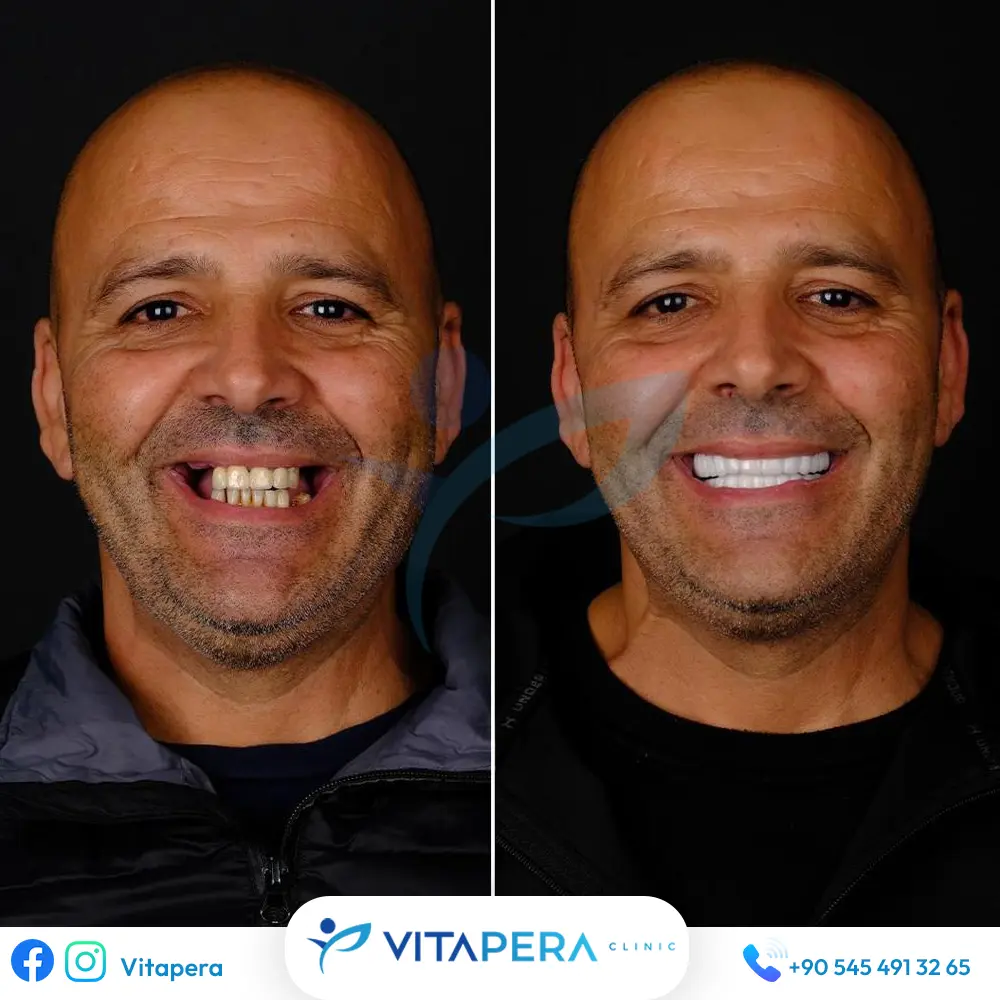
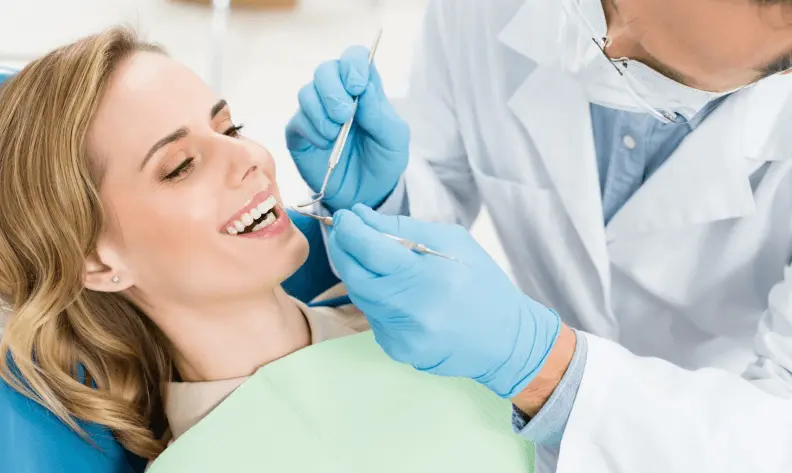
Everyone Has the Right to Look Better Make an Appointment Now!
Dental Treatment
Why Choose Turkey for Implants?
Affordable Prices
High-Quality Dental Care
Experienced dental professionals
Tourism

Why Choose Us?

Transportation
In Istanbul, your driver handles airport, hotel, and hospital transport.

Planning
Your companion translator handles all logistics for your comfort.

Accommodation
Free luxurious hotel accommodation is pre-booked by your consultant.

Aftercare
Our medical team offers lifetime support for all your inquiries and needs.
Ask Questions
You can call us 24/7 for your questions and inquiries about all of our Treatments & Procedures.
Before Procedure Tips
Abstain from alcohol for a week before the surgery to prevent bleeding complications.
Stop taking vitamins, vitamin E, and aspirin before the surgery as they can increase the risk of bleeding.
Avoid stimulants that could interfere with the anesthesia, such as alcohol and Arabic coffee, before the procedure.
Maintain adequate oral hygiene in the days leading up to the procedure
After Procedure Tips
Maintain dental hygiene and provide your teeth and their cleanliness regular attention.
Do not leave any food residue on the gums; thoroughly clean them.
Visit your dentist for a checkup every six months.
To sustain the implants, try to cut down or quit drinking and smoking.
We are always with you for your Health!
You can call us 24/7 for your questions and inquiries about all of our Treatments & Procedures.
Overview of Dental Implants Treatment

Anesthesia Method
Local Anesthesia

Duration Of
Intervention
1-3 Hours

Sports Activity Recovery
4-10 Weeks
Total Stay in Turkey
3 Nights

Social Life
Work After 2 Days

Work
After 2 Days

Hospitalization
No Need
3-4 Months
Curious About Patient Experiences?
Listen to Their Stories
Amazing Result!
Dental Implant Before & After

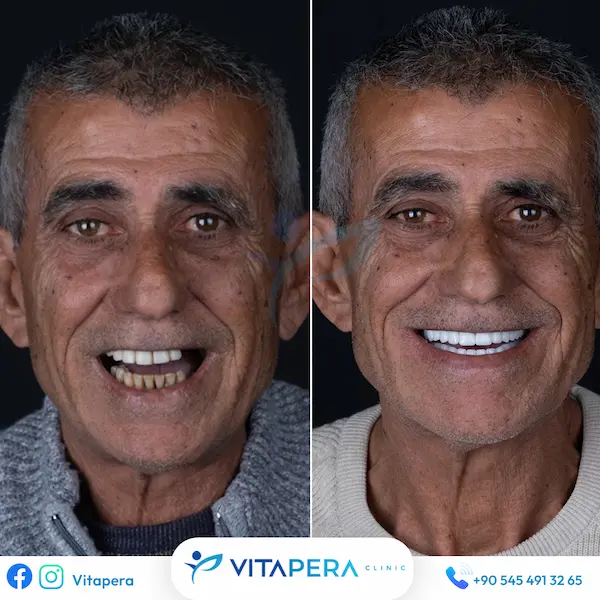
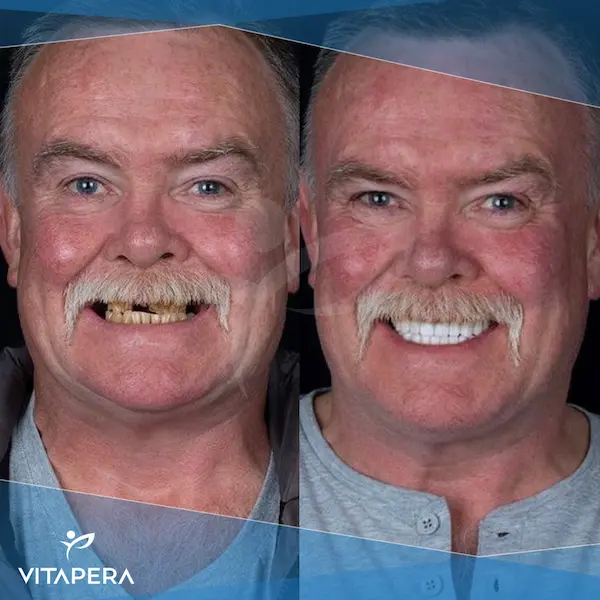
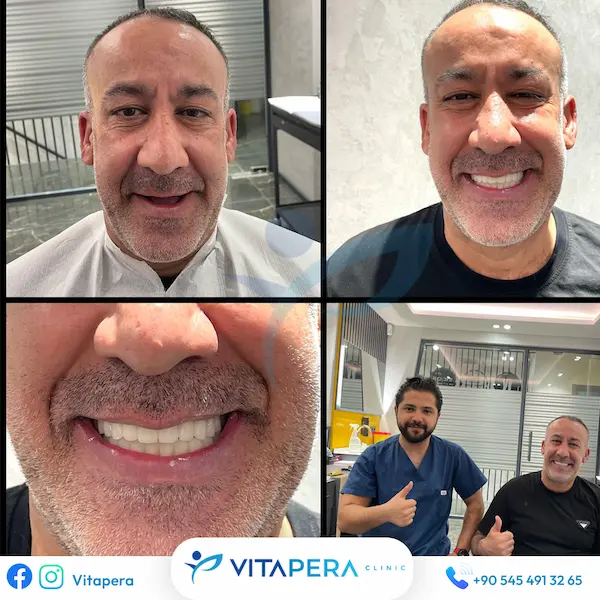
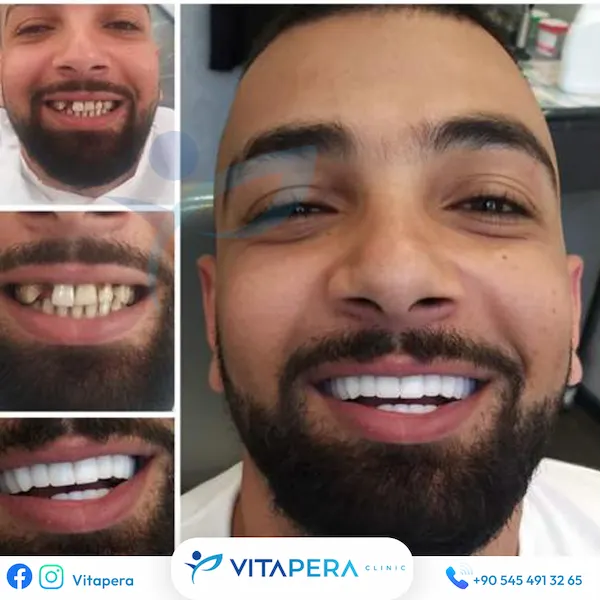
Dental Treatment
What Is a Dental Implant?
After the implant has successfully fused with the surrounding bone, a dental crown, bridge, or denture can be affixed to it in order to restore the appearance and function of the patient’s smile. The crown or other dental prosthesis is manufactured to order so that it will closely resemble the natural teeth in terms of color, size, and shape. This creates a result that is both practical and aesthetically acceptable.
Full mouth dental implants abroad are a popular choice, and Turkey offers top-notch services in this field. Get new teeth in Turkey and regain your confident smile with the help of skilled dental professionals. Turkey is renowned for its advanced dental implant procedures that offer a permanent solution for missing teeth. Consider dental implants in Turkey for a comprehensive and effective solution to restore your missing teeth.
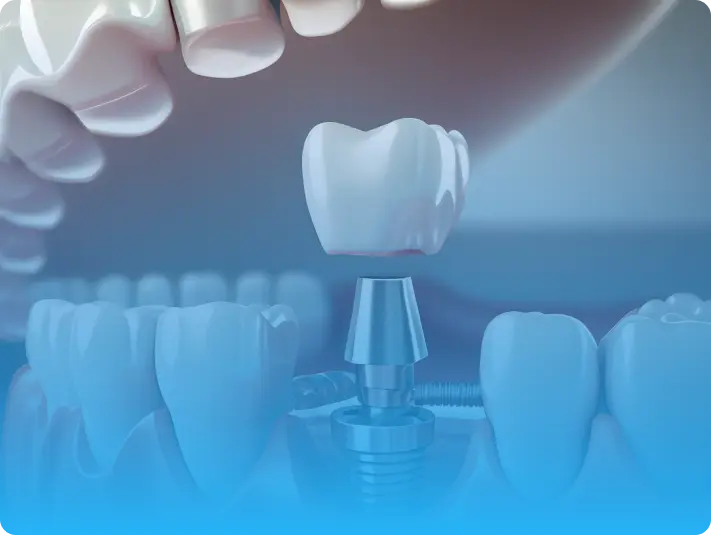
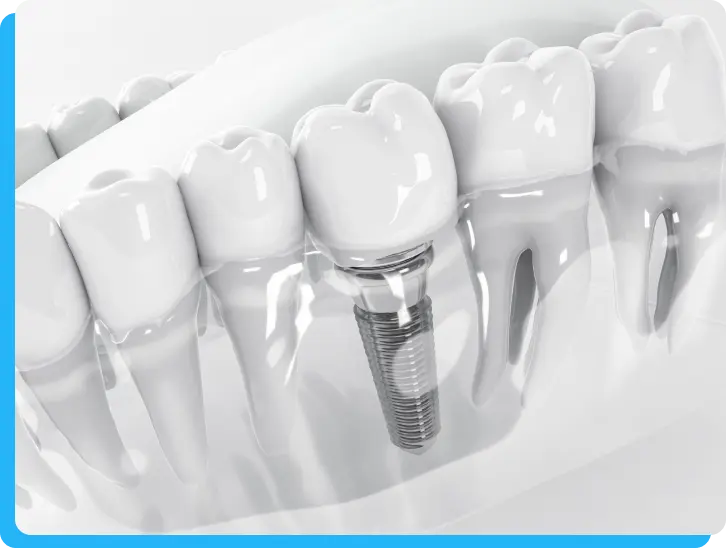

What Are the Three Types of Dental Implants?
Endosteal Implant
Subperiosteal Implant
Zygomatic Implant
We are always with you for your Health!
You can call us 24/7 for your questions and inquiries about all of our Treatments & Procedures.
Dental Treatment
What Are the Advantages of Having a Tooth Implanted?
Improved appearance: Dental implants are made to look and feel like real teeth. They are made to match the color, size, and shape of your natural teeth. This gives you a smile that looks good. Implants can help you feel better about yourself and boost your confidence by filling in the gaps left by lost teeth.
Better chewing and speaking: Dental implants give substitute teeth a strong and stable base. This makes it easier to bite and chew, which means you can eat a wider range of things. Implants also help people keep their speech clear by keeping them from slurring or mumbling, which can happen when teeth are missing.
Long-lasting: Dental implants are well-known for how long they last. With the right care and upkeep, implants can last for decades or even a lifetime. This makes them a long-lasting and cost-effective way to replace missing teeth. Traditional dental bridges and dentures may need to be replaced or adjusted over time, but implants are a more permanent option.
Jawbone and facial structure preservation: Missing teeth can damage the jawbone. Dental implants encourage bone growth and stop bone loss by stimulating the jawbone in the same way that real tooth roots do. This helps keep the jawbone strong and maintain the shape of the face. This keeps the face from looking droopy or old, which can happen when teeth are lost.
No effect on neighboring teeth: Unlike dental bridges, which require preparing and changing healthy teeth next to the gap, dental implants don’t use nearby teeth as support. This means that the natural teeth around the implant stay the same, which is good for their health and stability in the long run.
Easy care: Dental implants can be taken care of just like real teeth. Dental implants can stay healthy and last for a long time as long as you brush, floss, and go to the dentist regularly. There is no need for special glues or cleaning treatments, like with dentures.
Dental Treatment
Is Dental Implant Treatment Painful?
After surgery, it’s normal for the area that was treated to hurt a little, swell up, and get bruised. But you can usually treat these symptoms with over-the-counter painkillers, and they usually go away in a few days to a week.
The amount of pain you feel while you’re healing depends on things like how complicated the procedure was, how well you handle pain, and how well you follow post-operative directions. Your dentist or oral surgeon will tell you exactly what to do to take care of your implant site, deal with any pain, and help it heal properly.

What Is the Duration of Dental Implant Sessions?
Initial consultation
Treatment planning
Implant placement
Healing and osseointegration
Restorative phase
Final placement
Dental Treatment

Why Do People Prefer Dental Implants in Turkey?
Cost-effectiveness
High-quality dental care
Experienced dental professionals
Short appointment and procedure wait times
Turkey’s dental implant treatment is another benefit. In some countries, dental waitlists can postpone treatment. Turkey’s efficient healthcare system often provides timely care.
Tourism
We are always with you for your Health!
You can call us 24/7 for your questions and inquiries about all of our Treatments & Procedures.
Frequently Asked Questions
What Are the Limitations of Dental Implants?
Some of the problems with dental implants are:
- Successful implant placement requires enough bone mass. If there isn’t enough bone, you may need extra treatments like bone grafting.
- Some health problems and habits, like smoking, can make it harder for tooth implants to work.
- Healing and integrating can take a few months, so you need to be patient and follow your doctor’s directions.
- People with serious gum disease or untreated oral infections may not be able to get dental implants.
What Not to Eat After Implants?
Following dental implant surgery, it is critical to adhere to a diet consisting primarily of soft foods throughout the initial phase of the healing process. Foods that are hard and chewy, foods that are spicy or acidic, and foods that require a significant amount of biting or chewing should all be avoided.
What Kind of Oral Care Should I Apply After Having a Dental Implant?
Following surgery to insert dental implants, it is essential to practice careful oral hygiene. This entails carefully brushing the implant site with a toothbrush with soft bristles, carefully flossing around the implant, and following your dentist’s instructions for using an antibacterial mouth rinse.
Can You Brush Teeth After Dental Implants?
You can certainly continue to wash your teeth after getting dental implants. However, it is essential to exercise caution in the vicinity of the implant site in order to avoid causing any discomfort or irritation to the patient. Use a toothbrush with soft bristles, and be sure to follow the recommendations given to you by your dentist for the correct way to brush your teeth.
How Long After Implant Treatment Can You Eat Food?
When you can return to your normal eating routine after having implant treatment depends on the individual’s rate of recovery as well as the advice provided by your dentist. A diet consisting of soft foods is strongly recommended during the first several days up to a week after surgery. Following the instructions of your dentist, you should begin to gradually introduce solid foods as they are tolerated.
Will There Be Swelling / Bruising on the Face After Dental Implant Treatment?
Following dental implant surgery, it is common to experience some degree of swelling as well as bruises. However, the extent to which it affects every person can vary. It is possible to reduce swelling and bruising by making use of cold packs, taking any drugs that have been recommended, and following any other post-operative care instructions that have been given.
Is a Single Implant Required for Every Tooth Loss?
No, the replacement of every missing tooth does not necessitate the placement of a single implant. Depending on the unique circumstances of each patient’s situation, it may be possible to replace a number of missing teeth with either an implant-supported denture or a dental bridge supported by fewer implants.
Do Teeth Shift After Implant?
After they have been implanted and correctly repaired, dental implants provide stability to the teeth that surround them, preventing the neighboring teeth from shifting. Implants have the potential to assist in preserving the alignment of neighboring teeth as well as the dental arch as a whole.
What Is the Success Rate of Dental Implants?
The likelihood of success with dental implants is very high. Studies indicate that the success rate for dental implants is typically greater than 95%. However, the likelihood of success changes depending on a number of circumstances, including the position of the implant, the patient’s general health, the quality of their dental hygiene routine, and how closely they follow the post-operative care guidelines.


Everyone Has the Right to Look Better Make an Appointment Now!




